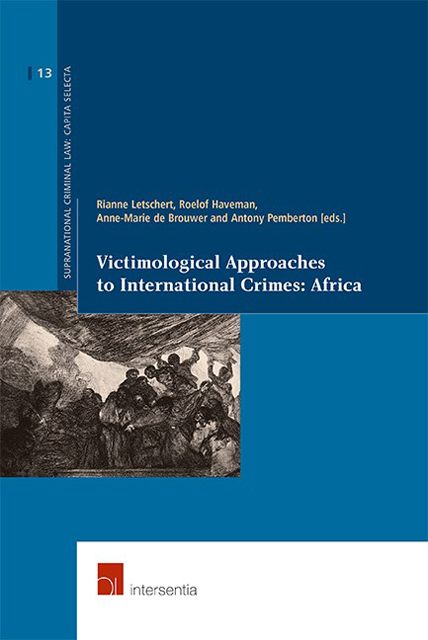Book contents
- Frontmatter
- Words of Appreciation
- Contents
- Introduction: Victimological Approaches to International Crimes
- Part I Victims of International Crimes
- Part II Reparative Justice
- PART III Amnesty, Truth, Reconciliation and Tradition
- Part IV International and National Legal and Policy Approaches
- Part V Victimological Approaches to International Crimes
- The Authors
- Bibliography
XV - Prosecution of Genocidal Rape and Sexual Torture before the Gacaca Tribunals in Rwanda
Published online by Cambridge University Press: 24 November 2022
- Frontmatter
- Words of Appreciation
- Contents
- Introduction: Victimological Approaches to International Crimes
- Part I Victims of International Crimes
- Part II Reparative Justice
- PART III Amnesty, Truth, Reconciliation and Tradition
- Part IV International and National Legal and Policy Approaches
- Part V Victimological Approaches to International Crimes
- The Authors
- Bibliography
Summary
INTRODUCTION
The genocide that hit Rwanda in 1994 has been the topic of many publications, academic and journalistic alike. From the start, a specific focus was put on sexual violence committed during the genocide. Many are the stories of women and men being the victims of rape and sexual torture. By including rape and sexual torture in the list of crimes to be tried, first by state courts, later shift ed to the gacaca tribunals, these crimes have officially been acknowledged as acts of genocide within the Rwandan judicial system.
Rape and sexual torture were among the last crimes to be tried by the gacaca tribunals. Starting mid-2008 and running to mid-2009, about 7,000 cases of rape and sexual torture were tried by 17,000 gacaca judges (Inyangamugayo) in 1,900 gacaca tribunals. Although it is extremely difficult to distinguish between bad and worse acts during genocide, rape and sexual torture may be considered among the worst. Trying genocide cases in general is not an easy task, but it may easily be assumed that trying sexual torture cases are amongst the most difficult; for the judges, and even more so for the victims involved, who have to narrate and relive the most intimate details of acts committed to them.
It is therefore that early 2008 it was decided that the Inyangamugayo should receive at least some training about how to deal with rape and sexual torture cases. Because of the language and the very specific experiences, it was decided that the experts/trainers should be Rwandans. Two trainers were identified: a lawyer for the legal issues (the first author of this chapter) and a psychologist for the psychological part of the training (Jeanne Marie Ntete). However, as it would have been impossible for two expert trainers to train all 17,000 Inyangamugayo within a reasonable time, it was decided to train a group of about 250 trainers, forming teams of a lawyer and a trauma counsellor, who together would train all Inyangamugayo during a three month period. This chapter describes sexual violence during the 1994 genocide on the Tutsi in Rwanda, and the way the Inyangamugayo were trained to handle these cases in the gacaca tribunals.
- Type
- Chapter
- Information
- Victimological Approaches to International Crimes: Africa , pp. 385 - 410Publisher: IntersentiaPrint publication year: 2011



